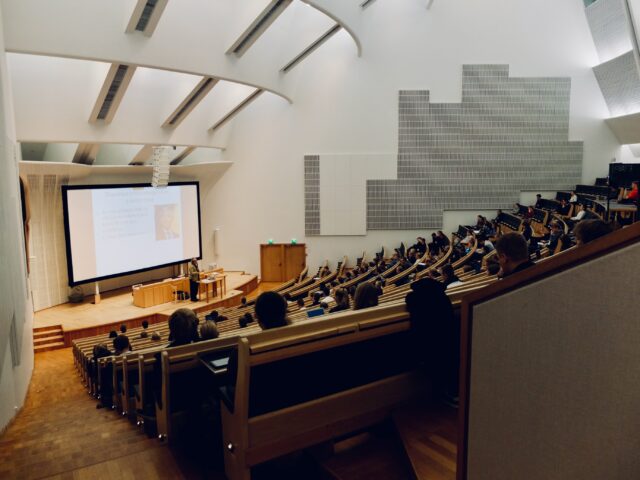The Government of Canada recently announced an investment of more than $4M for two projects that support the growth of Calgary’s aerospace industry. The University of Calgary will receive over $2.5M to establish the Aerospace Innovation Hub. The hub will provide startups and small- to medium-sized firms in the aerospace industry with development support, prototyping services, and access to testing equipment. The Southern Alberta Institute of Technology will receive over $1.4M for its remotely piloted aviation training centre for heavy-lift drones training, maintenance, and certification. Together, the two projects are expected to create nearly 100 jobs and train 160 participants.

Top Ten News
July 12, 2023
University of Waterloo students are feeling shaken following the recent stabbing of two students and one teacher inside a philosophy of gender classroom. A group of students have subsequently launched an online petition asking for security upgrades to the UWaterloo campus, including a more robust emergency alert system. In response to the petition, UWaterloo told CBC that the institution is taking steps to improve their emergency response system and plans to hold community forums about how to make the “campus safe and more inclusive, promote well-being and move forward together.”
In June, a vulnerability in the data file transfer service MOVEit Transfer impacted numerous US postsecondary institutions and other organizations. The software was purchased by several institutions to store and securely transfer sensitive data files. However, a security flaw in the software resulted in a cyber breach that has exposed the personal, financial, and/or health-related information of students and staff. Ransomware syndicate Cl0p has taken responsibility for the security breach. The software firm has since issued a series of patches to address the vulnerabilities.
Red Deer Polytechnic has announced that it will increase tuition rates by 5.5% for the 2023-24 academic year. Tuition fees will vary by program and course load. In a written statement, RDP stated that this decision is consistent with the recent tuition hikes by many other postsecondary institutions in Alberta. “It is never an easy decision for us to ask our students to pay more for their education,” read the statement. The Red Deer Advocate reports that the provincial government has capped tuition increases at 2% starting in 2024-25; no tuition cap is in place for the upcoming school year.
Camosun College has launched a new certificate program that focuses on the relational, cultural, and strategic dimensions of Indigenous leadership. The Advanced Certificate in Ways of Indigenous Leadership & Learning (WILL) program will provide Indigenous and non-Indigenous learners with expertise in Indigenous leadership practices. The 20-month program is offered through Camosun’s Eyēʔ Sqậ’lewen and will be co-taught with Māori scholars and Knowledge Keepers from Aotearoa (New Zealand). “This is a really important Indigenous-led program that brings together people from many different Nations and sectors,” said Camosun WILL Program Coordinator Jessica Morin. “Students will deepen their leadership philosophies and develop unique and diverse strategies to support their leadership work in these complex times of change.”
An editorial in Nature documents the findings of two researchers who tested the extent of ChatGPT’s paper-writing abilities. Scientists Roy Kishony and Tal Ifargan (Technion – Israel Institute of Technology) produced a complete paper in less than an hour by feeding ChatGPT suggestions and prompts. While the paper was clearly written and demonstrated good analysis, the researchers reflected that its findings were unoriginal and that ChatGPT had a problematic tendency to fill in research gaps by “making things up.” Other academics explained that while ChatGPT can accelerate research processes, it can also reproduce biases and “hallucinate” data. The article concludes that for these reasons, ChatGPT’s capacity to effectively produce entire papers may not yet be a threat to the academic space.
The Ontario Undergraduate Student Alliance (OUSA) has released a policy paper on how postsecondary institutions can be more inclusive to Two-Spirit and LGBTQIA+ individuals and communities. The paper states that many Two-Spirit and LGBTQIA+ students are eager to engage with their postsecondary environments, but face discrimination, harassment, or exclusion on campus due to their marginalized identities. OUSA provides a series of recommendations for institutions looking to show their commitment to Two-Spirit and LGBTQIA+ students, including improving campus and community climate and safety, enhancing health and wellness services, strengthening institutional policies to protect gender and sexually diverse communities, improving institutional knowledge on Two-Spirit and LGBTQIA+ communities and issues, and providing better training for faculty and staff on topics of gender inclusivity.
In an editorial for Psychology Today, Rob Danzman discusses disability services and some of the common accommodations that are provided to postsecondary students. Danzman lists the most typical accommodations available on campus, including special parking spaces, assistive listening devices, and note-takers for students. The writer suggests that students looking to access these services should contact disability services as early as possible–even before the semester starts–to avoid possible delays or complications. While most PSE disability services do a “fantastic job support[ing] students,” he concludes that students still must “find their voice and ask for what they need to get through each semester.”
Thompson Rivers University has announced that more women will have the opportunity to try out one of four skilled trades, as it is bringing the Women in Trades Exploratory Program to its Cariboo campus. In this program, women will have the opportunity to explore carpentry, heavy-duty mechanics, electrical, and welding trades; earn trades tickets; and prepare for either employment or further education. The university has also introduced a two-week mining component for participants interested in working in the mining sector. The program is tuition free, thanks to full funding from the Government of Canada.
The University of New Brunswick has reached a tentative agreement with the union that represents over 430 employees at its Fredericton and Saint John campuses. PSAC Local 60551, Professional and Technical Staff Union has engaged in collective bargaining since August 2022. Union members will vote to ratify the tentative agreement; details of the agreement will be released to the public following ratification.
